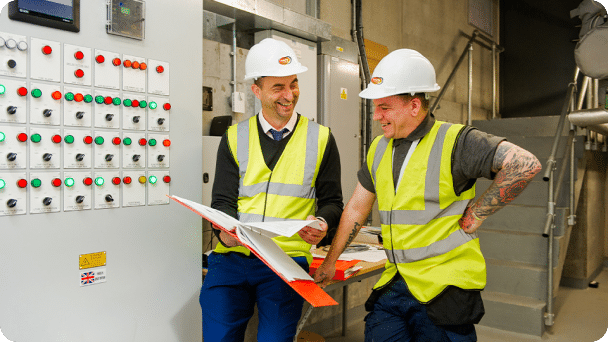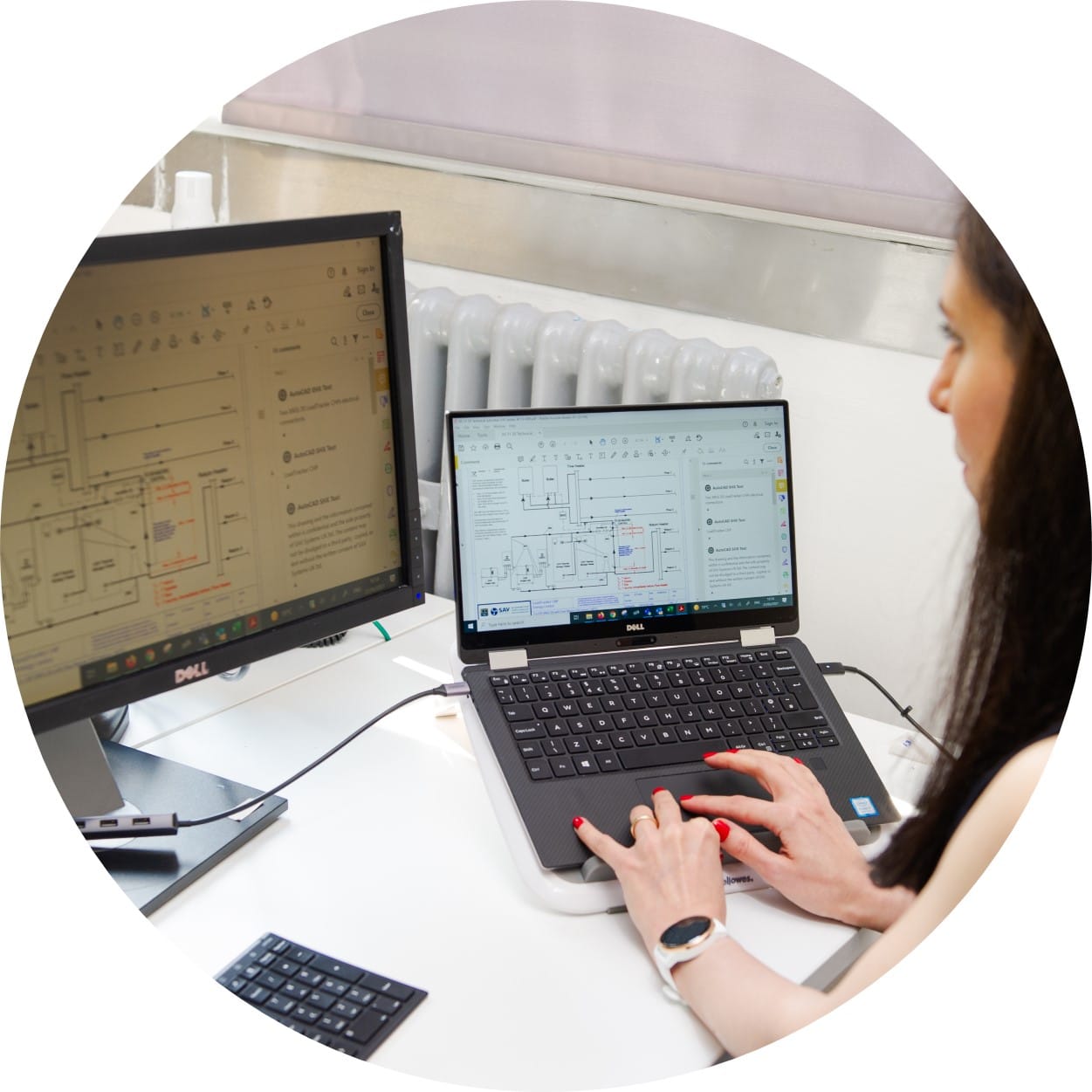Careers
It’s an exciting time to be part of a growing sector in the sustainability space. From entry level through to senior management within specialist and support functions, there is a huge range of diverse opportunities for those looking to join and develop within the heat network industry.

Career opportunities
in heat networks
Growing the heat network sector to provide 20% of heat by 2050 offers substantial economic opportunities. Reaching this target will require some £60 – £80 billion of investment and create about 30,000 jobs across the UK. The sector will generate significant career opportunities at all levels.

Current Vacancies
Whilst we are unable to list individual opportunities on this website, we have collected together a selection of links below for industry websites that will publish career opportunities within the UK heat networks sector.
Heat Networks Industry Council
We will publish our members news on our LinkedIn page, which will include job vacancies.

The Association for Decentralised Energy
The ADE publishes a selection of job opportunities on the news pages of their website.

The UK District Energy Association
The UK District Energy Association publishes a selection of its members’ job vacancies on their website.

District Heating Divas
The UK District Heating Divas publishes a selection of its members’ job vacancies on their website.
Education
and training
The Heat Networks Industry Council is working with the Government to ensure new initiatives are put in place to boost skills and training – meeting the needs of our growing sector. New opportunities for training and education are constantly being developed and we have highlighted below some examples.

Apprenticeships
Several specialist heat network apprenticeships are being developed, with the aim of boosting the next generation of skilled technicians and professionals needed as the UK transitions to a greener economy. More information can be found on the Institute for Apprenticeships & Technical Education’s website.
Training
The Heat Networks Industry Council is working with the Government to ensure new initiatives are put in place to train the future workforce needed as the UK transitions towards low-carbon heating.
Further Education
The Heat Networks Industry Council is working with the Government to ensure new initiatives are put in place to educate the future workforce needed as the UK transitions towards low-carbon heating.

Max – Operations Project Manager
About me and my career path:
During my time at university, I came to the realisation that a career in biomedicine wasn’t for me. However, having graduating during the pandemic, I found that it was very much an employers’ market at the time I came to look for an alternative career path. Having had an internship in accountancy during my university years, and considering my family’s history in that field, I decided to explore job opportunities in accountancy as well as more general project management.
Eventually, after casting the net far and wide, I landed a job as a Project Assistant in the energy efficiency sector. As a temporary position, I felt it was a good opportunity to gain experience and build my skillset. After a couple months in the role, I was offered a permanent position and a year after that I was promoted to Assistant Project Manager. After another year in the new role, an opportunity with Insite Energy as an Operations Project Manager arose. I was keen to take on more responsibility and to work in London, and the Insite role seemed like a good fit for my career goals, offering opportunities to progress my project management skills and personal development.
Current role:
I was already working in the energy sector, so the opportunity with Insite appealed to me because it was linked to my current field but offered a chance to learn about a slightly different aspect at the same time as developing my project management skills. Initially, I didn’t know what to expect, but the experience has been rewarding as I find myself learning new things about the sector every day. This constant learning keeps me interested as the industry is not stagnant; it is constantly evolving and changing due to new technologies and its role in the journey to achieving net-zero.
Why heat networks:
I’m relatively new to the sector but I believe that there will be plenty of opportunities as the industry grows and takes on a more prominent role in the net-zero transition. I enjoy the varied nature of operational project management, with each day bringing new challenges and learning experiences, and hope to continue to develop these skills within the sector. It’s an exciting time to be part of this field, and while I’m not entirely sure what the future holds, I see it as an opportunity to grow along with the industry.

Hannah – International Trainee
About me and my career path:
In 2021, I landed my first job writing for an asset finance magazine. It was no National Geographic, but the concept of merely reaching financial independence was enough to make me giddy about it. Despite this, and not for the want of trying, I very quickly came to accept that I held no more than a crumb of enthusiasm for developments in the leasing industry. When even the story about leasing baby pandas failed to ignite an ounce of emotion within me, I knew it was game over. I wasn’t looking for crumbs of enthusiasm for my career, I was looking for a whole cake.
Three months into my second job, I was mugged while walking home one evening in South London and, upon sharing the news with my manager on Monday morning, she instructed me not to “take my foot off the gas” because I had sales targets to hit. Clearly, the copy of Psychological Safety by Amy Edmondson she kept on her bookcase – visible in Zoom meetings – hadn’t yet reached the top of her reading list. I left after four months. I wasn’t for crumbs, and I wasn’t looking to be commoditised either.
If there is one big positive to glean from two sub-optimal bouts of employment, it was clarity on what I did want. And so the job-hunting process began once more. This time, to find a job advancing the energy transition, in a role that would stretch me and in an organisation and industry that would offer me a sense of community. In my 734th hour of trawling the LinkedIn jobs page, I came across an opening on the Vattenfall International Trainee Programme in the UK Heat Strategy team. Bingo.
Current role:
Across all the books, articles and interviews I had read about reaching net zero, it was clear that society had already gone for a lot of the low hanging fruit. The real challenge was decarbonising heat, and I wanted in. I am now coming to the end of my trainee year (which I could write a whole article on in itself) and I am hoping to take on a role within Strategy or Business Development, advancing the provision of city-scale district heating to provide buildings across the UK with low-cost and low-carbon heat.
Why heat networks:
Heat networks lie at a fascinating intersection between local communities, renewable energy and sustainable urban development. It is the balancing act of all these elements that makes the heat network industry such a multi-faceted and exciting place to work. It is understanding how to help local councils decarbonise a whole city. It is ensuring all families have access to affordable, reliable and low-carbon energy. It is championing energy efficiency in its purest form by capturing excess heat in the atmosphere and using it to warm homes and buildings. It is the heat network sector and it is brilliant.

Shannon – Operations and Maintenance Engineer
About me and my career path:
I joined Vital Energi as an Operations and Maintenance Engineer after leaving the merchant navy and have been with the company for 6 months now. My job calls for me to run and oversee two sites, making sure they perform safely and efficiently to provide heat whilst maintaining their parameters. . I schedule and undertake maintenance; perform inspections and monitor the system and I absolutely love it. I’ve kept all the best bits of my merchant navy job, whilst being able to come ashore and live a more sociable lifestyle.
I’ve been here 6 months, everyone is eager to help and I am gaining more experience every day . I love working with experienced engineers who talk me through new tasks, expand my knowledge in engineering and are keen in working together to help each other out. The diversity within O&M has been so beneficial to me as I am constantly learning new skills and ways to work from them.
Current role:
A lot of the work at Athlete’s village and Queens Quay is very similar to what I was doing onboard ships, so I can transfer my skills. Ships tend to take their heat from the engines to heat their domestic water, so CHPs were relatively similar. We undertook engine overhauls on the ship so I was intrigued with the annual boiler inspections and the work that goes into it, so it was great that there was a lot of things I could confidently work on straight away.
My merchant navy career took me to some far-flung places and saw me sail through the Panama Canal and spend time in South America amongst other places. After 6 years however, I was ready to end to the two-months-on two-months-off routine and applied for a job at Vital Energi.
Why heat networks:
I initially did a HND at college in Electrical Engineering. With this I was planning on going to university but I was more so interested in the practical work and getting experience. The cadetship offered 8 months of experience with getting the qualification so it was an easy decision for me to make and it turned out to be the most amazing experience.
I was in the merchant navy for 6 years and the knowledge and experience I gained really positioned me well for finding another job and the green energy industry looked like a great place for me to use my skills.
The Diverse Heat Network
The Diverse Heat Network has been established to ensure that the emerging UK heat network sector leaves no stone unturned when it comes to attracting talented people to drive the industry forward. Success depends on being attractive as a destination and a career for people regardless of race, gender, sexuality, age, social class and so on.
As a vertically integrated market, we have an opportunity within district heating to shape the most diverse and representative sector in the energy industry and we intend to be vanguards of this approach. An industry that is reflective of society is also far more likely to be successful in persuading society to adopt the solutions they are advocating.
